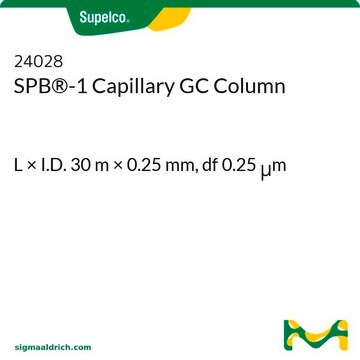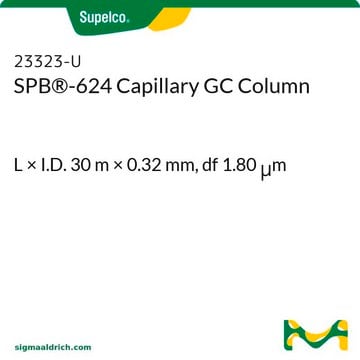Any analyst with the need for a non-polar column. Some applications include boiling point separations, GC-MS analyses of semivolatiles, and GC-ECD analyses of pesticides/PCBs. It is estimated that non-polar columns account for 51% of the worldwide column market.
Wichtige Dokumente
28472-U
SLB®-5ms GC-Kapillarsäule
L × I.D. 60 m × 0.25 mm, df 0.25 μm
Synonym(e):
GC-Säule, SPB-5, 5 % Diphenyl, Massenspektrometrie
About This Item
Empfohlene Produkte
Materialien
fused silica
Qualitätsniveau
Agentur
Standard Method 6040D
EN 2005/108/EC
EPA 610,625,8015,8082,8100,8141,8270,OLM04.2 SVOA
EPA TO-13,IP-8,8270,525.2,608.1/608.2,608/8081/OLM04.2 PEST
JMHLW
NIOSH 2530,5503
OSHA 62
meets requirements for USP G27 and G36
suitable for EPA 1613
Einhaltung gesetzlicher Vorschriften
FDA LIB 4423
Parameter
-60-340 °C temperature (isothermal)
-60-360 °C temperature (programmed)
Beta-Wert
250
df
0.25 μm
Methode(n)
GC/MS: suitable
gas chromatography (GC): suitable
L × ID
60 m × 0.25 mm
Aktive Matrixgruppe
Bonded and highly crosslinked; silphenylene polymer virtually equivalent in polarity to poly(5% diphenyl/95% dimethyl siloxane) phase
Anwendung(en)
agriculture
chemicals and industrial polymers
cleaning products
clinical
cosmetics
environmental
flavors and fragrances
food and beverages
forensics and toxicology
industrial hygiene
life science and biopharma
personal care
petroleum
pharmaceutical (small molecule)
Säulenart
capillary non-polar
Suchen Sie nach ähnlichen Produkten? Aufrufen Leitfaden zum Produktvergleich
Verwandte Kategorien
Allgemeine Beschreibung
USP-Code: Diese Säule erfüllt die Anforderungen von USP G27 und G36.
Phase:
- Gebunden und hoch vernetzt
- Das Silphenylen-Polymer ist hinsichtlich seiner Polarität nahezu äquivalent zu Poly(5%-Diphenyl/95%-Dimethylsiloxan)
- ≤0,32 mm ID: -60 °C bis 340 °C (isotherm) oder 360 °C (programmiert)
- ≥0,53 mm ID: -60 °C bis 330 °C (isotherm) oder 340 °C (programmiert)
Anwendung
- [Determination of propargite, tebuconazole and bromopropylate pesticide residues in Taiwan green jujubes by gas chromatography-tandem mass spectrometry].: Diese Studie legt den Fokus auf die Bestimmung von Pestizidrückständen mittels Gaschromatographie mit Massenspektrometriekopplung und zeigt die Anwendung der SLB-5ms GC-Kapillarsäule bei der Analyse landwirtschaftlicher Produkte hinsichtlich Sicherheit und Compliance (Zhang et al., 2014).
- Characterisation of capillary ionic liquid columns for gas chromatography-mass spectrometry analysis of fatty acid methyl esters.: Diese Forschungsarbeit charakterisiert die Leistung von Kapillarsäulen für ionische Flüssigkeiten, indem sie deren Effizienz in der Gaschromatographie-Massenspektrometrie für die Analyse von Fettsäuremethylester betont. Dieser Prozess ist wesentlich für die Bioanalytik und Umweltchemie und bietet Anwendungsmöglichkeiten mit der SLB-5ms GC-Kapillarsäule (Zeng et al., 2013).
Sonstige Hinweise
Rechtliche Hinweise
Lösungsmittel
Hier finden Sie alle aktuellen Versionen:
Besitzen Sie dieses Produkt bereits?
In der Dokumentenbibliothek finden Sie die Dokumentation zu den Produkten, die Sie kürzlich erworben haben.
Artikel
The analysis of melamine and related compounds in dog food with the use of more economical gas chromatography-mass spectrometry (GC-MS) instrumentation.
Verwandter Inhalt
This page is intended to make it easier to find the consumables you need based on the analytical method you’re using. Methods included on this page come from the EPA, Standard Methods and ASTM.
-
Who uses SLB™-5ms Capillary GC Columns?
1 answer-
Helpful?
-
-
What are the benefits of the SLB™-5ms Capillary GC Column over other manufacturers’ -5ms columns?
1 answer-
The SLB-5ms excels in several performance criteria.· Low Bleed. The highly crosslinked silphenylene polymer chemistry reduces column bleed to a very low level, resulting in greater signal-to-noise level, allowing lower detection levels.· Inertness. The proprietary surface deactivation reduces interactions between analytes and the column surface, resulting in sharper peak shapes, allowing lower detection levels.· Durability. With the highest published maximum allowable operating temperature (MAOT) of any -5ms column, SLB-5ms columns are designed for long life.· Consistency. Innovative manufacturing processes result in decreased column variability, ensuring that the next column is as good as the last.
Helpful?
-
-
How does the SLB™-5ms Capillary GC Column differ from our other 5-type columns?
1 answer-
Many of our other 5-type columns (Equity-5, SPB-5, PTE-5, MDN-5, and MDN-5S) incorporate a siloxane polymer (backbone comprised of Si and O atoms only, side groups are either methyl or phenyl). The SLB-5ms column incorporates a silphenylene polymer (backbone comprised of Si and O atoms plus some phenyl groups, side groups are either methyl or phenyl).
Helpful?
-
-
Would you recommend SLB™-5ms Capillary GC Columns for all applications instead of Equity-5, SPB-5, PTE-5, MDN-5, and MDN-5S?
1 answer-
Yes.
Helpful?
-
-
What if my method does not allow me to change to SLB™-5ms Capillary GC Columns?
1 answer-
These methods typically specify a 5-type column (DB-5 or equivalent). The SLB-5ms satisfies that requirement.
Helpful?
-
-
What is the Department of Transportation shipping information for this product?
1 answer-
Transportation information can be found in Section 14 of the product's (M)SDS.To access the shipping information for this material, use the link on the product detail page for the product.
Helpful?
-
Active Filters
Unser Team von Wissenschaftlern verfügt über Erfahrung in allen Forschungsbereichen einschließlich Life Science, Materialwissenschaften, chemischer Synthese, Chromatographie, Analytik und vielen mehr..
Setzen Sie sich mit dem technischen Dienst in Verbindung.



